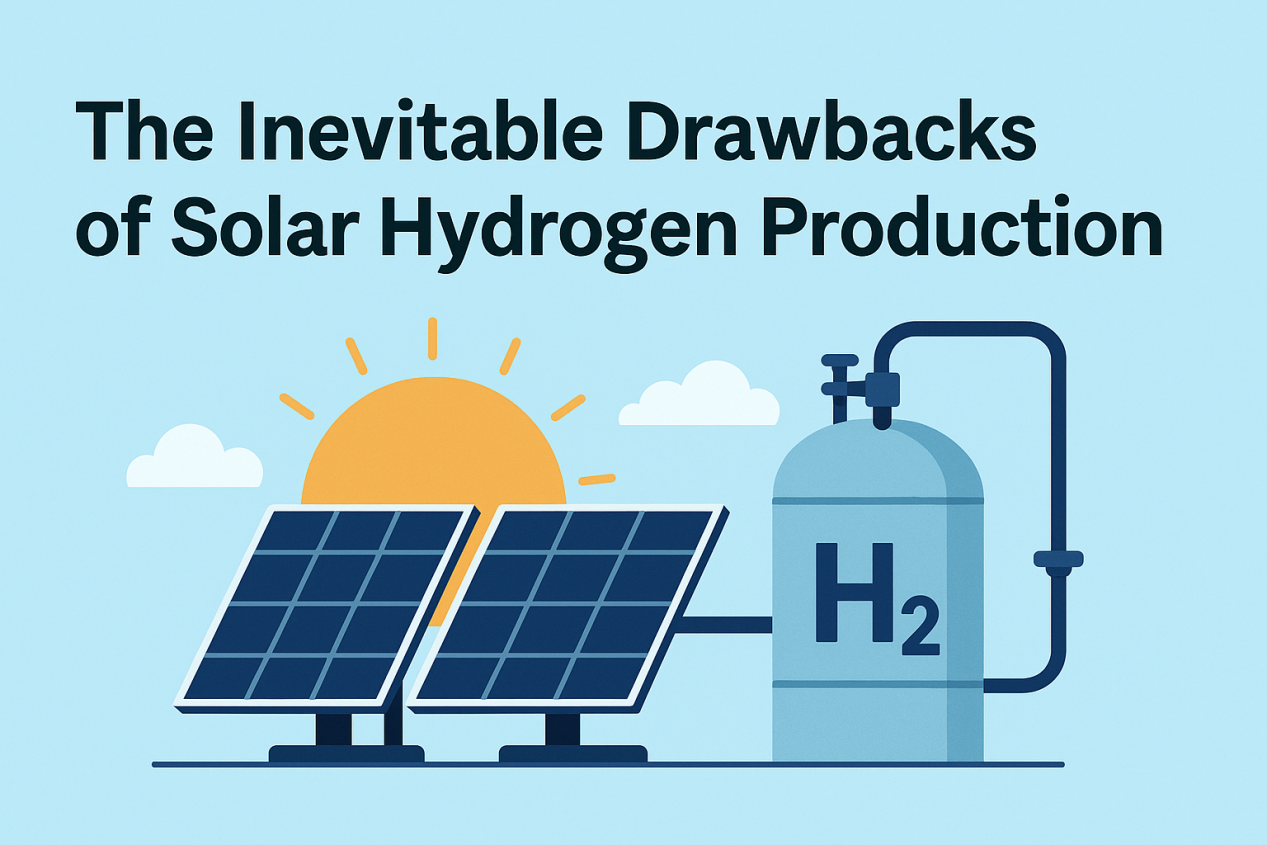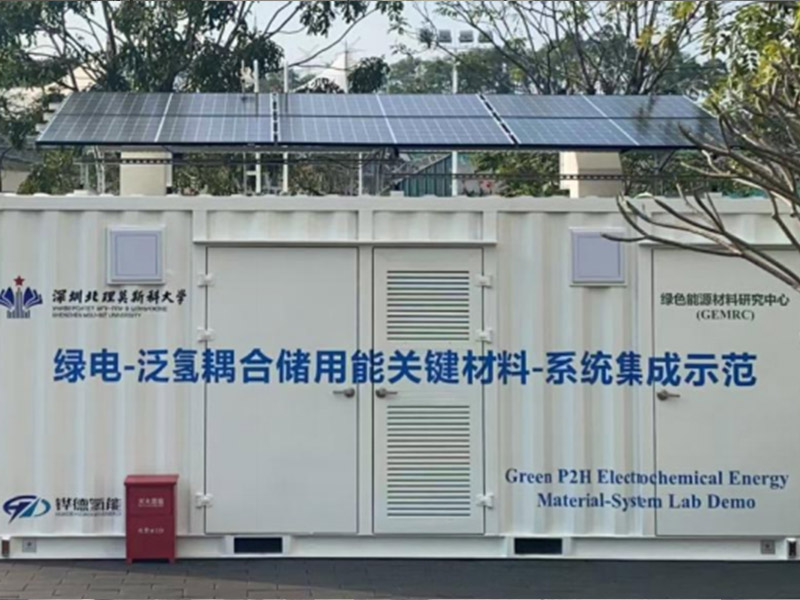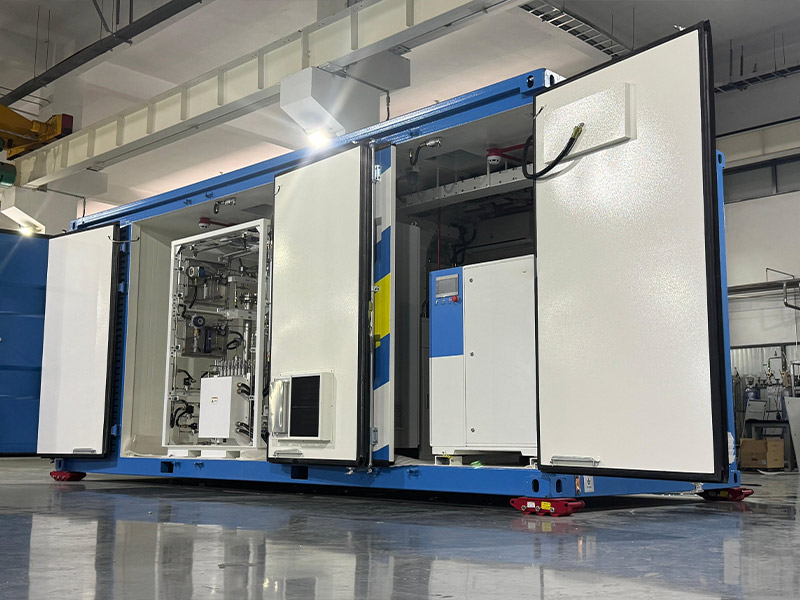Solar hydrogen production is often hailed as a revolutionary clean energy solution. By using solar power to split water molecules through electrolysis, we can produce hydrogen without carbon emissions. But while this method holds significant promise, it also comes with a set of challenges. This article explores the inevitable drawbacks of solar hydrogen and why understanding them is crucial before embracing the technology.

Keypoints
l Solar hydrogen production uses solar-powered electrolysis to split water but faces significant challenges.
l High initial costs for solar panels, electrolyzers, and storage make adoption expensive without subsidies.
l Multiple energy conversions reduce efficiency to below 30%, making it less effective than batteries for short-term storage.
l Sunlight dependency and water usage limit reliability, especially in cloudy or water-scarce regions.
l Hydrogen’s flammability requires strict safety measures for storage and transport.
l Despite drawbacks, it offers zero-emission energy and long-term storage, useful for industries like aviation.
l Currently, it works best as a supplement rather than a full replacement for home energy needs.
Setting up a solar hydrogen production system involves significant upfront costs. This includes the capital required for purchasing, installing, and integrating various components necessary for a fully functional setup.
Unlike simple solar panel systems, solar hydrogen production requires advanced technology and specialized equipment, which can drive up the price significantly. In most cases, this investment is only viable when spread over many years or offset by government subsidies.
l Solar panels must be powerful enough to generate surplus electricity.
l Electrolyzers—the devices that split water into hydrogen and oxygen—are still expensive and require maintenance.
l Hydrogen storage units must meet safety standards and can be costly to install.
For homeowners considering a home solar hydrogen generator, these costs might not be feasible without subsidies or long-term payback periods.
Solar hydrogen systems involve multiple stages of energy conversion, each introducing energy loss. This multilayered process reduces the total amount of usable energy that can be captured and stored, compared to more direct solutions like battery storage.
The efficiency losses occur at each stage, and the overall system performance remains a barrier to mainstream adoption.
l Sunlight to electricity (via solar panels).
l Electricity to hydrogen (via electrolysis).
l Hydrogen back to electricity or heat (via fuel cells or combustion).
Current estimates show that overall efficiency can be below 30%, making it less efficient than some alternative renewable systems.
Like all solar-based technologies, solar hydrogen production relies heavily on sunlight. Solar panels are the primary component used to capture solar energy, and the efficiency of the entire hydrogen production process is directly linked to the availability of sunlight.
This dependency poses a challenge in areas with limited sunlight or during seasons when the sun isn't consistently shining.
l At night or during cloudy weather.
l In geographic areas with limited sunshine.
Although hydrogen energy storage allows energy to be kept for later use, the variability in solar generation still makes it difficult to ensure consistent supply without backup systems.
Hydrogen production through electrolysis consumes purified water, which can raise concerns in water-scarce regions. Electrolysis is the process that splits water molecules into hydrogen and oxygen, but it requires a significant amount of water to produce the hydrogen fuel.
While hydrogen production itself is a clean and sustainable process, the demand for purified water can create an unintended challenge, especially in areas where water resources are already limited.
For large-scale hydrogen energy storage facilities, this becomes a significant concern in water-scarce regions. Additional purification steps may be required, increasing cost and energy usage.
Hydrogen is a flammable gas and must be handled with care. For both residential and industrial applications, hydrogen storage, transport, and use require strict adherence to safety protocols to prevent accidents and ensure the safe utilization of the gas. While solar hydrogen production offers a promising clean energy solution, it also introduces safety challenges that need to be addressed.
l Pressurized tanks for safe hydrogen storage.
l Leak detection and ventilation systems.
l Specialized pipelines and transport logistics.
For homeowners considering a home solar hydrogen generator, safety regulations must be strictly followed to mitigate the risks associated with hydrogen gas. These include ensuring that all installations are completed by certified professionals and that appropriate storage and handling equipment is in place to minimize the potential for accidents.
Despite these challenges, solar hydrogen remains a key player in future clean energy systems. When combined with hydrogen energy storage, it offers a long-term solution for sectors where batteries fall short—such as shipping, aviation, and heavy industry.
l It produces zero emissions during operation.
l Hydrogen can be stored long-term without significant loss.
l It provides flexibility for both grid-tied and off-grid applications.
Yes, with certified equipment and proper installation, home solar hydrogen generators can be safely operated.
Currently, it serves best as a supplemental energy source. Due to cost and efficiency limitations, full replacement isn’t yet practical for most homes.
Hydrogen can be stored for months without degrading, making it ideal for seasonal energy storage.
It depends on the use case. Batteries are more efficient for short-term storage, while hydrogen is better for long-term, large-scale applications.


